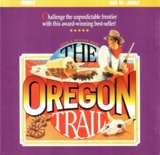Who doesn't remember this game from their youth?
During the entire trek, the player had to make the best use of his limited resources (food mostly, as well as spare parts for the covered wagon). The objective was to arrive in Oregon with as much money, livestock, and supplies as possible, with which to start a successful new life.
As food ran out, the player could hunt, which as a nine-year-old was my favorite part of the game. The player would control a crudely pixilated pioneer, armed with a rifle, which strangely enough had nearly unlimited ammunition, and fired semi-automatically as fast as the space bar could be depressed. Various creatures would enter the forested area in which the pioneer was hunting; unfortunately regardless of how many animals were shot, the pioneer could only haul 100 pounds back to his wagon.
Along the trail the player had to contend with challenges to include washed out bridges and flooded fords. Additionally, damage to the covered wagon (broken axles were popular), dead oxen, and outbreaks of deadly diseases (mostly typhoid and diphtheria) would slow the westward progress. Bad decisions would result in lost supplies and delays in travel.
The game could be rather grim. When the pioneer's children or wife died of disease or accident, they would be buried along the trail; the grimmest aspect was that the player could choose the epitaph for the tombstone, which would be viewable when the player next tried his luck at "Oregon Trail," and once again passed the part of the trail upon which tragedy struck. If the player failed to reach Oregon, he too would earn his own customized tombstone.
"Oregon Trail," for its simplistic, circa-1985 technology, and bare-bones graphics, was a fun game, and it allowed young children the opportunity to learn trouble-shooting skills, as they made the decisions which would allow their covered wagon riding pioneers to succeed or fail.

